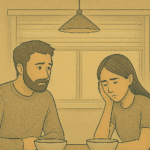The Link Between Trauma and Depression

But what if depression surfaces after something traumatic that happened in our past? Or a recent trauma we’ve tried our best to put behind us?
Every year, around 1 in 10 American adults experience major depression or another type of depression.1 And for many, depression comes about as an after-effect of a traumatic incident.
If you have depression that you believe may be linked to trauma, or know someone who might, it can help to understand the true relationship between the two. Once you understand this, you can work on getting the support you, or your loved one, needs.
Below, we’ll look at the relationship between trauma and depression in-depth, the signs you may be experiencing post-trauma depression, and the treatment options available.

Key Takeaways
- Trauma — whether a single event or prolonged stress — can increase the risk of depression.
- Emotional, physical, cognitive, and behavioral changes may signal trauma-induced depression.
- It’s common for trauma survivors to experience overlapping trauma reactions (e.g. anxiety, flashbacks) and depressive symptoms.
- Treatment and support — therapy, structured trauma care, social support, and healthy coping — can help recovery.
Table of Contents
What Is the Relationship Between Trauma and Depression?
Trauma occurs when we experience events that are highly stressful, distressing, or frightening. These events push us outside of our ability to cope, leaving things feeling outside of our control or hopeless.
Trauma can take many forms. It can occur after traumatic childhood experiences or any form of abuse, such as:
Trauma can also occur after a one-off incident such as a natural disaster, crime, or accident. Experiencing trauma and abuse can both lead to a mental health condition, particularly post-traumatic stress disorder. PTSD develops when our life or health is threatened by an event, or when a loved one’s life is in jeopardy.
But what about trauma and depression? Well, research shows that those who have experienced trauma are at heightened risk of having depression in life. Studies show that around 30-50% of people with PTSD have significant symptoms of depression.2
Therefore, there appears to be a strong link between the two. Yet, how do you know if you’re struggling with the symptoms of trauma itself or post-trauma depression? Let’s explore the key signs of post-trauma depression next.
What Are the Symptoms of Post-Trauma Depression?
However, there appears to be considerable overlap in post-trauma depression symptoms from person to person, some of which we share below:3
Difficulty focusing- Thinking of suicide
- Feeling down about yourself
- Feeling down or sad most of the time
- Losing interest in the things you used to enjoy
- Sleeping and eating either more or less than usual
Types of Trauma and Their Impact on Depression
Trauma is a very broad term that can happen as a result of many different life experiences. We touched on the forms of abuse above, and while experiencing abuse doesn’t always mean you will have trauma symptoms, the two are closely interlinked. For more information on this link, check out our page on “Treatment for Trauma and Abuse in Adults.”
In addition to the forms of abuse we mentioned earlier, the following life experiences can also lead to trauma:4
- Bullying
- Complex trauma (exposure to multiple traumatic events)
- Natural disasters such as hurricanes, floods, tsunamis, droughts, etc.
- Medical trauma
- Race-based trauma
- Refugee trauma
- Sex trafficking
- Traumatic grief
- Terrorism and violence
So, what impact do specific forms of trauma have on depression? The research into this is patchy. However, studies show that the impact of trauma on depression differs based on gender. For men, experiencing non-sexual interpersonal trauma (such as exposure to domestic abuse) is linked to co-occurring depression and PTSD. For women, trauma related to army deployment and sexual trauma are linked to co-occurring PTSD and depression.5
More research is needed to fully understand the links between trauma and depression and to identify which forms of trauma may contribute to depression symptoms.
Trauma and Depression Treatment Options
Trauma and depression are both sensitive mental health conditions that need to be thoroughly understood and treated with care. The typical course of treatment for depression and trauma is a combination of psychotherapy and medication, or just psychotherapy by itself if your symptoms aren’t severe.
However, it’s important to note that the route you go down is entirely your choice. Everyone is different, and choosing the right treatment for you will make a big difference in how well you manage both conditions.
Psychotherapy
Psychotherapy is shown to be a highly effective treatment, both for depression and for the after-effects of trauma, including PTSD. The most effective forms of psychotherapy for PTSD and trauma appear to be:6-8
Cognitive Behavioral Therapy (CBT):
CBT can help those with PTSD recognize and change their negative thought patterns that are contributing to their emotional distress. This psychotherapy focuses on the connection between thoughts, emotions, and behaviors, aiming to replace unhelpful patterns with healthier coping strategies. CBT has also proven highly effective at treating depression for the same reason.- Cognitive Processing Therapy (CPT): CPT is a specialized form of CBT that involves trauma survivors reframing the unhelpful beliefs related to their trauma. It also encourages them to process difficult memories in a way that reduces distress and helps them heal.
- Cognitive Therapy: Yet another variation of CBT, cognitive therapy helps target negative evaluations and traumatic memories that are causing distress. This approach aims to help people break free from the cycles of fear, self-blame, and avoidance.
- Prolonged Exposure (PE): PE therapy gradually exposes a person with PTSD to trauma-related thoughts, emotions, and situations they may have been avoiding. This process helps retrain the brain to recognize that these cues are no longer dangerous, which can help reduce fear over time. Research suggests that PE is particularly useful for those experiencing co-occurring PTSD and suicidal ideation.
It’s important to note that severe depression can make psychotherapy less effective for those struggling with PTSD. So, finding a quality, evidence-based treatment and trustworthy treatment center is fundamental. Complementary strategies that treat both depression and PTSD symptoms are important. So, it’s vital to work alongside an organization or individual who understands both conditions and your unique circumstances.
Medication for Trauma and Depression
Research shows that the selective serotonin reuptake inhibitors (SSRIs) sertraline and paroxetine are particularly effective for those struggling with PTSD alongside depression. These two medications have been approved by the Food and Drug Administration (FDA), so they should be safe to use.9
However, it’s important to note that depression medications can come with some intense side effects, so they’re not for everyone. Furthermore, some people find that medication doesn’t ease their depression symptoms – a form of depression known as treatment-resistant depression.
If you do want to go down the medication route, speak to your doctor or one of our psychiatric experts at Mission Connection. We can help you to identify a course of treatment that works best for you and is grounded in research.
Our Trauma-Informed Approach to Trauma-Related Depression Treatment
At Mission Connection, our clinical foundation is recovery-oriented cognitive therapy (CT-R). This means that we follow a structured, evidence-based method to help people like you manage mental health difficulties such as trauma-related depression.
Recovery-oriented cognitive therapy is an evolution of traditional cognitive therapy, developed by Dr. Aaron Beck and his colleagues at the Beck Institute. It shifts the focus from simply reducing symptoms to helping you reconnect with a sense of life’s purpose and motivation, to build a life that feels more meaningful.
Following a CT-R approach means that rather than targeting symptoms, we focus on helping you identify your strengths, values, and personal goals. Our therapists will work with you rather than simply treating your symptoms, which can help you leave feeling more confident than you arrived.
What’s more, we use a structured, flexible approach that’s not only tailored to your needs, goals, and history but is completed in a format that works for you: either in-person or online.
Contact Our Team Today for Trauma and Depression Treatment
If you’re sick of struggling with trauma-related depression and want to seek guidance or treatment from a professional, get in touch. We will help you every step of the way, meeting you where you’re at rather than expecting you to mold yourself to us.
We pride ourselves on our accessibility, which is why we not only offer multiple treatment approaches, but also accept many insurance providers.
Get in contact today at 866-711-1328 or get started here.

References
- National Institute of Mental Health. (n.d.). Major Depression. https://www.nimh.nih.gov/health/statistics/major-depression
- Campbell, D. G., Felker, B. L., Liu, C.-F., Yano, E. M., Kirchner, J. E., Chan, D., Rubenstein, L. V., & Chaney, E. F. (2007). Prevalence of depression–PTSD comorbidity: Implications for clinical practice guidelines and primary care-based interventions. Journal of General Internal Medicine, 22(6), 711–718. https://doi.org/10.1007/s11606-006-0101-4
- U.S. Department of Veterans Affairs. (2025). Depression, trauma, and PTSD. https://www.ptsd.va.gov/understand/related/depression_trauma.asp
- The National Child Traumatic Stress Network. (2018, May 25). Trauma types. https://www.nctsn.org/what-is-child-trauma/trauma-types
- Wanklyn, S. G., Pukay-Martin, N. D., Belus, J. M., St. Cyr, K., Girard, T. A., & Monson, C. M. (2016). Trauma types as differential predictors of posttraumatic stress disorder (PTSD), major depressive disorder (MDD), and their comorbidity. Canadian Journal of Behavioural Science / Revue canadienne des sciences du comportement, 48(4), 296–305. https://doi.org/10.1037/cbs0000056
- American Psychiatric Association. (2020, June). PTSD treatments. https://www.apa.org/ptsd-guideline/treatments#:~:text=at%20a%20glance-,About,negative%20effects%20on%20current%20life
- Kline, A. C., Cooper, A. A., Rytwinski, N. K., & Feeny, N. C. (2021). The effect of concurrent depression on PTSD outcomes in trauma-focused psychotherapy: A meta-analysis of randomized controlled trials. Behavior Therapy, 52(1), 250-266. https://doi.org/10.1016/j.beth.2020.04.015
- Rozek, D. C., Baker, S. N., Rugo, K. F., Steigerwald, V. L., Sippel, L. M., Holliday, R., Roberge, E. M., Held, P., Mota, N., & Smith, N. B. (2021). Addressing co-occurring suicidal thoughts and behaviors and posttraumatic stress disorder in evidence-based psychotherapies for adults: A systematic review. Journal of Traumatic Stress. https://doi.org/10.1002/jts.22774
- Holtzheimer, P., & Montano, M. (2024). Clinician’s guide to medications for PTSD. U.S. Department of Veterans Affairs. https://www.ptsd.va.gov/professional/treat/txessentials/clinician_guide_meds.asp
Trauma & Depression FAQs
Trauma-induced depression refers to depressive symptoms that begin after experiencing significant psychological or physical trauma — often as part of a broader reaction to that trauma.
Yes — psychological trauma, especially intense or prolonged trauma, can disrupt brain chemistry and coping mechanisms and lead to depression even in people without previous mental-health issues.
Signs may include persistent sadness or numbness, loss of interest in usual activities, changes in sleep or appetite, fatigue, difficulty concentrating, social withdrawal, or intrusive memories and nightmares.
Yes — with the right treatment, support and time, many individuals heal and regain well-being. Addressing both trauma and depressive symptoms improves long-term outlook.
Mission Connection offers trauma-informed assessment and personalized treatment plans — combining therapy, support, and coping strategies tailored to trauma survivors.
- Signs of Treatment-Resistant Depression
- Signs of Depression Relapse
- Depression-Related Sleep Issues
- Depression Symptom Checklist
- ICD-10 Criteria for Depression
- Major Depressive Disorder (MDD) Symptoms
- Depression Symptoms
- Depression Self-Test
- PHQ-9 Depression Test
- Warning Signs of Depression
- Types of Depression
- Best Therapies for Depression
- Talk Therapy for Depression
- Telehealth for Depression
- Personalized Therapy for Depression
- Holistic Treatment for Depression
- Online Therapy for Depression
- Effective Treatments for Depression
- Medications for Depression
- Treatment-Resistant Depression Options
- Depression Relapse Prevention





